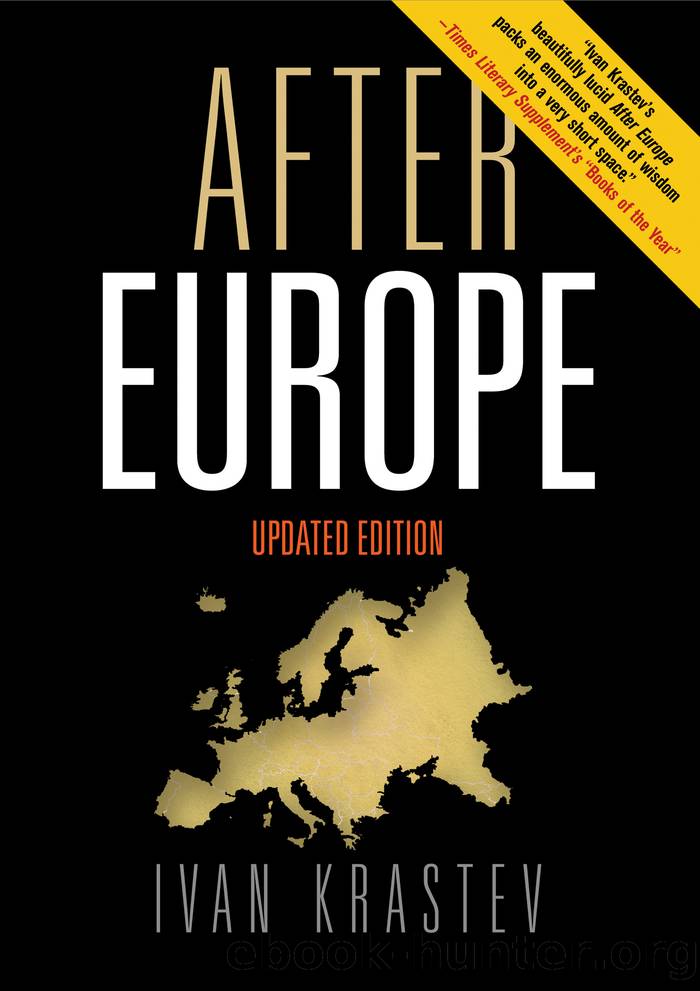After Europe by Krastev Ivan;

Author:Krastev, Ivan;
Language: eng
Format: epub
Publisher: University of Pennsylvania Press
Published: 2019-07-15T00:00:00+00:00
The Central European Paradox
In the last decade, European integration has been widely understood and accepted as the major factor guaranteeing the irreversibility of the democratic changes in the postcommunist countries of central Europe. Much as Europe’s welfare state guaranteed a safety net to the most vulnerable members of society, there has been a belief that the European Union is its own safety net for the new democracies from the East. The EU developed institutional mechanisms of peer pressure and carrot-and-stick policies that have the capacity to prevent the backsliding of democratization in its new members. This grand expectation, however, has turned out to be wrong. The electoral victory of Viktor Orbán in Hungary and Jarosław Kaczyński in Poland and the “illiberal turn” in most of central Europe has forced many commentators to upend their view of the “Brussels effect” on the process of democratic consolidation in central Europe.
In the view of political scientists James Dawson and Sean Hanley, marrying the process of democratization to the process of European integration has contributed to the emergence of fair-weather democracies in the East with political elites that lack genuine commitments to liberal values.8 Even more important is the effect of the European Union serving as a kind of safety net, which mitigates against risk-taking (keeping countries from advancing irresponsible policies) but incentivizes voters to support irresponsible political parties and leaders as a way of signaling disappointment and anger. Why should Poles fear someone like Kaczyński if they know that Brussels will tame him if he goes too far? Paradoxically, the twinning of Europeanization and democratization has turned central Europe into a poster child of democratic illiberalism. In the prophetic words of Hungarian prime minister Viktor Orbán, “A democracy is not necessarily liberal. Just because something is not liberal, it still can be a democracy.” Moreover, “One could—and indeed should—say,” he insisted, “that societies founded upon liberal principles of organizing a state will likely not be able to sustain their global competitiveness in coming years—rather, it is more likely that they will suffer a setback, unless they manage to reform themselves substantially.”9 In this context, central Europe’s slide into illiberalism was not an unintended consequence. It was a choice. And in order to understand this choice, it is important to ascertain what made central Europeans so nervous about liberal democracy in the first place.
The “populist turn” varies in different countries, but we can nonetheless identify commonalities. The rise of populist sentiments signals a return to political polarization and a more confrontational style of politics. It is also a return to more personalized politics in which political leaders play an outsized role and institutions are frequently mistrusted. The Left-Right divide is being replaced by a conflict between internationalists and nativists, and the explosion of fears that it unleashes marks a violent distancing between democracy and liberalism. But populism’s key feature is a hostility not to elitism but to pluralism. As Jan Werner-Müller writes in What Is Populism?, “Populists claim that they and they alone, represent the people.
Download
This site does not store any files on its server. We only index and link to content provided by other sites. Please contact the content providers to delete copyright contents if any and email us, we'll remove relevant links or contents immediately.
The Secret History by Donna Tartt(16611)
The Social Justice Warrior Handbook by Lisa De Pasquale(11486)
Thirteen Reasons Why by Jay Asher(7783)
This Is How You Lose Her by Junot Diaz(5754)
Weapons of Math Destruction by Cathy O'Neil(5032)
Zero to One by Peter Thiel(4818)
The Myth of the Strong Leader by Archie Brown(4786)
Promise Me, Dad by Joe Biden(4441)
Stone's Rules by Roger Stone(4413)
Beartown by Fredrik Backman(4406)
How Democracies Die by Steven Levitsky & Daniel Ziblatt(4393)
The Fire Next Time by James Baldwin(4338)
100 Deadly Skills by Clint Emerson(4072)
A Higher Loyalty: Truth, Lies, and Leadership by James Comey(4027)
Rise and Kill First by Ronen Bergman(4009)
The David Icke Guide to the Global Conspiracy (and how to end it) by David Icke(3876)
The Farm by Tom Rob Smith(3870)
Secrecy World by Jake Bernstein(3774)
The Doomsday Machine by Daniel Ellsberg(3726)
